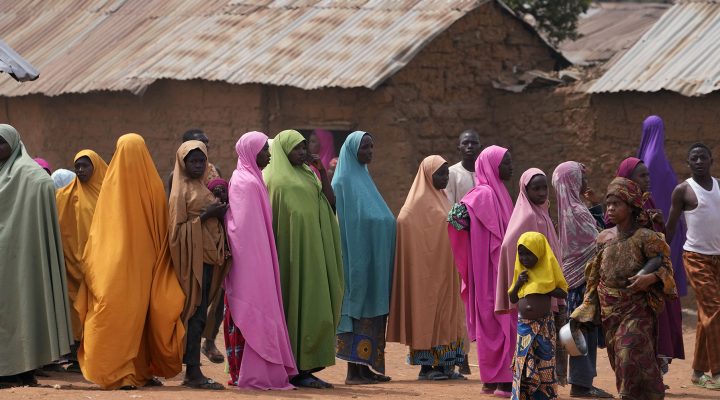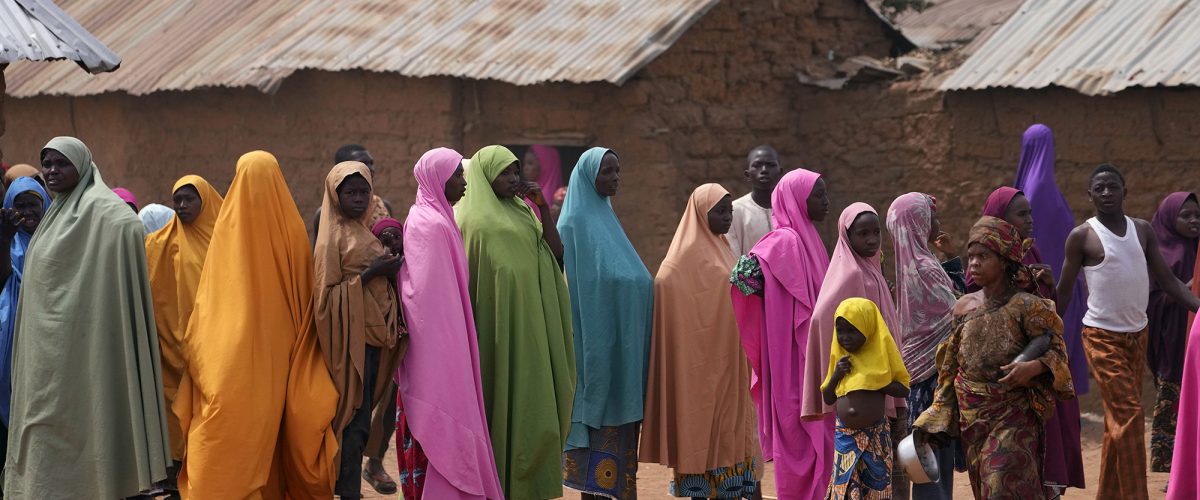In the last couple of weeks, terrorists in Nigeria invaded and kidnapped about 300 people, including nursing mothers and children as young as 2 and 5 from schools, a highway and internally displaced peoples camp in Kaduna, Katsina, and other places in the northern part of the country.
The West African country of more than 200 million people faces economic challenges, high unemployment and insecurity. Amid this backdrop, kidnapping of innocent people has become all too common.
Average people there have lost count of the number of times such attacks have occurred over the past decade.
As pressure mounted from Nigerians for the country’s security officials to find and rescue the latest victims, news emerged that the terrorists were demanding 1 billion naira (about $715,000) in ransom payment to release those kidnapped. Such demands are common with kidnappers in the region.
While families of victims looked to the government for help, the administration headed by Bola Tinubu made it clear his government would not pay ransom to kidnappers to release their victims. This was made known by the country’s information minister, Mohammed Idris, who said: “Mr. President has directed that no ransom will be paid by government to any of these criminal elements.”
On March 24, news emerged that victims of the Kaduna kidnap had been freed. Prior to that, some other victims in nearby Katsina state also reportedly regained their freedom. But it was unclear whether money had exchanged hands before the captives were set free.
Kidnapping for ransom is one of the known sources of funding for terrorist groups in Nigeria which includes Boko Haram, Islamic State West Africa Province, ANSARU and Fulani extremists.
Kidnapping for ransom is one of the known sources of funding for terrorist groups in Nigeria which includes Boko Haram, Islamic State West Africa Province, ANSARU and Fulani extremists.
Boko Haram was the first of the terrorist groups to gain global attention. Initially out to hunt and persecute Christians, the group — comprised of blood-thirsty, drug-crazed maniacs — extended its sight to targeting moderate Muslims who don’t share their ideology.
Generally, billions of naira are suspected to have been paid to terrorist groups operating in Nigeria by families of victims and even government officials as ransom in recent years.
Ransom payment is just one source of funds for terrorist groups — not only in Nigeria but elsewhere. According to a recent report by the U.S. Treasury Department, kidnapping for ransom and extortion also provide a significant amount of money for ISIS, another terrorist group mainly active in the Middle East and Asia and affiliated with Boko Haram.
The report notes that “despite suffering leadership losses, ISIS maintains organizational cohesion in Syria and Iraq and has access to significant funds, estimated between $10 million and $20 million, mostly held in cash and other liquid assets.” Regional ISIS networks, it said, extort local populations as part of their effort to exert influence in parts of Syria and Iraq. In addition, “ISIS members continue to receive contributions from like-minded sympathizers through informal funds transfer networks to secure the release of ISIS associates from detention, particularly in northeastern Syria.”
The report states that “since 2019, ISIS has been increasingly relying on Africa-based branches to generate revenues probably because the group perceives less counterterrorism pressure in Africa compared to the Middle East.”
A major part of this scheme is ISIS in Somalia. The group is said by government officials to have “generated millions of dollars from extortion and exploited the Somali financial system to launder money through businesses, hawalas, banks and mobile money transfers.”
Since 2022, the ISIS branch in Somalia is estimated to have generated about $6 million, mostly from extortion and local taxes.
In another report, the U.S. Treasury’s Office of Foreign Assets Control identified and imposed sanctions on 16 entities and individuals who it says “compose an expansive business network spanning the Horn of Africa, the United Arab Emirates and Cyprus that raises and launders funds for al-Shabaab, a terrorist group affiliated with al-Qa’ida.”
Al-Shabaab has been blamed for some of the worst terrorist attacks in East Africa.
“Al-Shabaab generates over $100 million per year by extorting local businesses and individuals, as well as through the financial support of affiliated businesspeople,” the U.S. report states. “The threat posed by al-Shabaab is not limited to Somalia. Al-Shabaab’s revenues are disbursed to other al-Qa’ida-supported groups worldwide and help fund al-Qa’ida’s global ambitions to sow discord and undermine good governance.”
Brian E. Nelson, undersecretary of the Treasury for terrorism and financial intelligence, said the United States is committed to undermining the activities of terrorist groups and “working with regional partners to root out terror financing networks and the entities they abuse to raise and move funds.”
The report lists the names of those known to be key players in this financing scheme.
By various accounts, religion is one factor driving this terrorism.

Justin Dyikuk
Justine John Dyikuk, a Catholic priest and insurgency expert who’s currently a Ph.D. student at the University of Strathclyde in the UK, told Baptist News Global an important point when analyzing terrorism is to find the motivation, the driving force behind it and sources of funding.
“It is crucial to identify the nature of war, the inspiration behind jihadi groups and their sources of finance. Without finding the right answers to these questions, global peace would be hard to come by,” he said.
Terrorism takes various forms — full-blown war, insurgency, violent attacks, social unrest, religiously motivated violence, political upheaval and online recruitment, he said. “A recurrent decimal in terrorist activities is guerilla tactics of hit-and-run, covert and overt operations that target civil authorities, the armed forces and civilians.”
Religious motivations and political motivations merge in some of these groups. But the fuel always is money.
The importance of money to terrorism activities cannot be overemphasized, he said. “No organization survives without funding. To this end, money/finance is important to the operations and sustenance of terrorist groups locally, regionally and internationally.”
Yet finding a way through this is made difficult by governments and politicans who “use thugs (with links to) extremist sects,” he added. “This also applies to the West and international organizations that buy gold, oil and uranium, to mention just a few, from black markets across Africa while the continent is on fire.”
More resources are available to combat this problem, Dyikuk insists. “In a sane world where AI and super surveillance technology can monitor the way you snore while fast asleep, it does not require rocket science to monitor and neutralize the activities of terrorist organizations. Strengthening international laws and ensuring legislation and prosecution remains crucial.”
Anthony Akaeze is a Nigerian-born freelance journalist who lives in Houston. He covers Africa for BNG.


